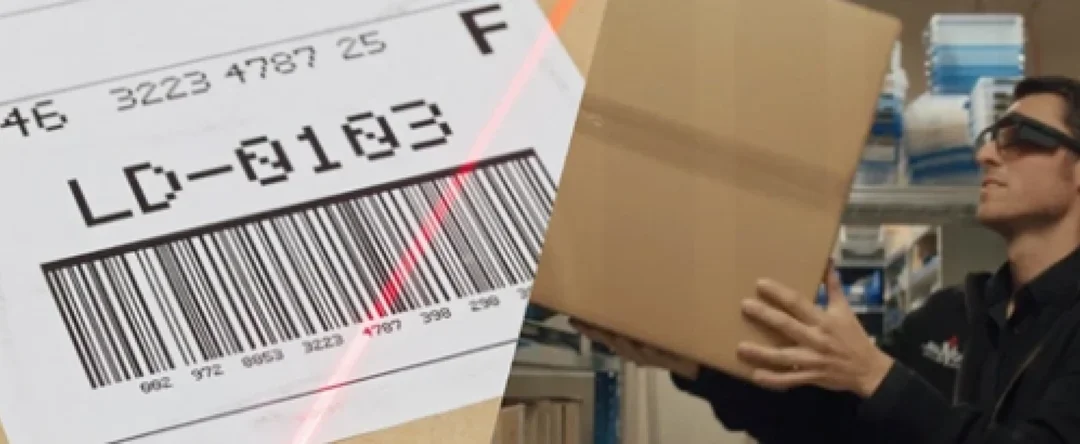Wearable barcode scanners usher in hands-free workflows
For centuries, the primary purpose of eyeglasses has been improving vision (and perhaps making someone look a bit smarter). However, with the evolution of technology, eyeglass manufacturers and Internet pioneers have joined forces to dramatically modernize eyeglasses by creating smart glasses.
So, what exactly are smart glasses?
Smart glasses superimpose information onto the wearer’s field of view via an optical head-mounted display (OHMD), a transparent heads-up display (HUD), or an augmented reality (AR) overlay. These systems can reflect projected digital images as well as allow the user to see through it or see better with it. Instead of typical peripherals like the keyboard and mouse, users control smart glasses by touching, tapping, or verbalizing requests.

Displayed data on smart glasses could include news or navigation prompts; functions include taking photos via touch or voice input. Social media quickly embraced smart glasses; specialty models, such as Spectacles by Snap Inc., record and upload videos to the Snapchat multimedia messaging app. Just like other wearable technologies, smart glasses found their footing by offering up handsfree functionality and automatic data capture like self-quantification (e.g., recording a wearer’s activity levels).
Google pioneered the way for smart glasses in 2013 with the introduction of Google Glass Explorer. Unfortunately, the design was not a commercial success. The aesthetics held limited appeal, and wearers found them to be both uncomfortable and expensive. It appears as if designers seemingly built a solution before identifying a real problem–many tech industry observers concluded that Google lacked focus.
Smart glasses get down to business
There are a handful of companies out there today standing on Google’s shoulders to evolve smart glasses by turning them into necessary tools, like wearable barcode scanners (also called barcode readers). The segment leaders are customer-centric–they’ve carefully defined sector-specific issues and validated users’ wants and needs. Major players, including Teamviewer, Vuzix, Iristick, and RealWear, have successfully launched a range of smart glasses to provide hands-free workflows within various verticals and applications. With products like the Iristick G1, it’s evident that each firm identified and then clearly solved problems for users within those verticals. Smart glasses are used in security applications, such as body cameras for law enforcement, health applications (e.g., health education or remote consultations), and industrial applications such as remote assistance in hazardous areas. If combined with AR, smart glasses transform into a powerful tool that helps digitize workflows in logistics, manufacturing, maintenance, and repair. Digitization and hands-free workflows (like hands-free barcode scanning) increase organizational speed and efficiency, reduce downtime and errors, and improve employees’ experiences.
Looking sharper, being smarter, working faster
Barcode scanning takes seconds (advanced barcode scanning software does it in one millisecond), so why does it need to be faster? eCommerce giants promising same-day shipping have logistics and warehouse associates seeking out time-saving tech, making smart glasses for hands-free barcode scanning a perfect fit. Day in and day out, barcodes surround us because they’re seemingly printed on almost every single product. This ubiquity means that there could be thousands upon thousands of SKUs within a fulfillment center that must be quickly scanned, packaged, re-scanned, labeled, and shipped. Advanced products like Iristick’s smart glasses enable employees to use pick-by-vision–wearers look at it, scan it, and use voice commands for efficient order picking.
Given how prevalent barcodes are in our daily lives, several other user groups with intricate or repetitive work steps would benefit from keeping their hands free to perform more important tasks. Great examples of these users are field service technicians who may use wearable barcode readers and hands-free scanning to read a label and get detailed instructions via their smart glasses’ HUD. This functionality is made possible by smart glasses that are equipped with AR solutions. Supporting AR are camera- and software-enabled extras such as Code Corporation’s CortexDecoder software development kit (SDK). Code’s mobile SDK uniquely features a specialized detection algorithm that provides hands-free barcode reading on virtually any surface and can scan more than one barcode at a time. SDK-equipped wearables enable technicians, logistics, and retail employees to easily scan multiple barcodes on inbound shipments, barcodes on malfunctioning components, or provide on-the-spot assistance for retail customers.
How do smart glasses enable hands-free workflows?
Although hands-free tasks can range from the mundane (like stock and price checks) to the critical (like repairing an ailing power transformer), they all rely on barcode scanning accuracy, speed, and reliability. The right barcode scanning software development kit for smart glasses should integrate tightly with the smart glasses’ camera to properly tilt the lens and maximize contrast. If the SDK can’t do this, 2D barcodes (like QR codes) are distorted and won’t scan. Advanced SDKs like the CortexDecoder can also read damaged or smudged barcodes, enabling smart glasses wearers to work without needless interruptions. Properly equipped smart glasses can even perform offline scanning, which may be needed for postal deliveries in rural areas that lack Internet or a robust wireless network.
A looking glass into the future?
Like the smartphone and smartwatch that came before, smart glasses are seemingly ripped from the pages of 1940s era comic books. It’s clear that just like other smart wearables, smart glasses have gone from a Silicon Valley novelty to a powerful and legitimate business tool capable of streamlining routine tasks like barcode scanning in logistics and production.
Hands-free barcode scanning with smart glasses is a prelude to the future of barcode scanning and work itself. Smart glasses don’t just increase operational efficiency, they also drive up workforce productivity, creating long-term savings.

Share This Post
Author

Jessica Foo
Many of the talented and qualified staff at Code Corporation contribute to our blog. Our team members add a unique perspective to our communications efforts, and we are fortunate to have such a great cadre of writers as part of our company.
